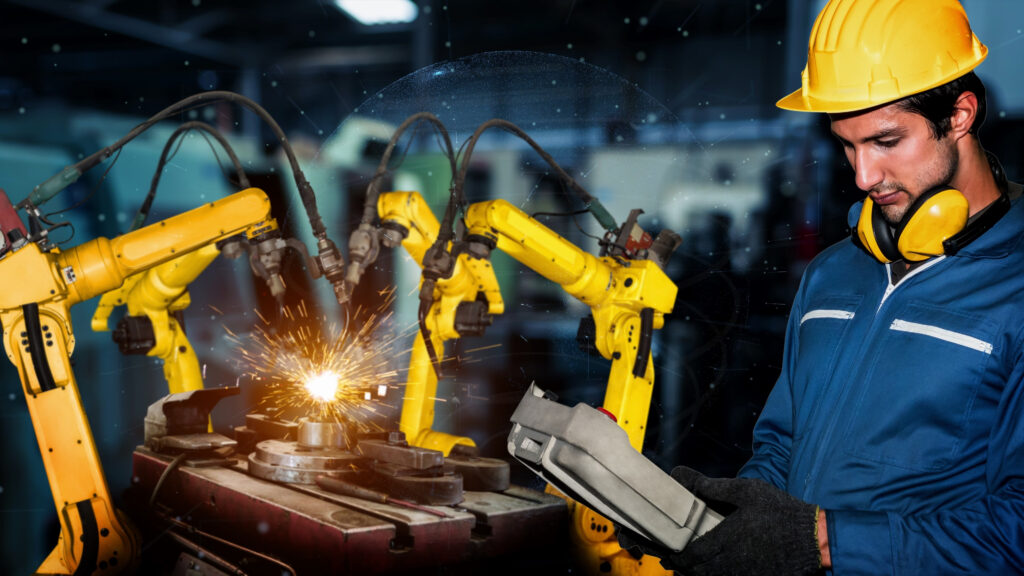Introduction
Smart Manufacturing has revolutionized the industrial landscape, reshaping how products are made, and ushering in a new era of efficiency, quality, and sustainability. This article delves into the concept of Smart Manufacturing, its core components, evolution, and the benefits it brings to the industry.
“Smart manufacturing is the notion of orchestrating physical and digital processes within factories and across other supply chain functions to optimize current and future supply and demand requirements. This is accomplished by transforming and improving ways in which people, process, and technology operate to deliver the critical information needed to impact decision quality, efficiency, cost, and agility.” – Gartner
Overview of Smart Manufacturing
Smart Manufacturing encompasses a range of technological innovations, including the Internet of Things (IoT), Artificial Intelligence (AI), and Big Data Analytics. These technologies enable real-time monitoring, predictive maintenance, and data-driven decision-making.
According to a report by Forbes Tech Council in 2023, it accelerates business growth by focusing on products, people, and assets, driving a fundamental shift in how manufacturing companies operate. Companies that embrace Smart Manufacturing gain a competitive edge through increased efficiency and responsiveness to market demands.
Key Components of Smart Manufacturing
Smart Manufacturing relies on the seamless integration of digital technologies. IoT sensors collect data from machines, allowing manufacturers to monitor performance and detect issues in real-time. This data is processed by AI algorithms, providing actionable insights for optimization.
Cloud computing plays a pivotal role in Smart Manufacturing, enabling remote monitoring and data storage. Oracle reports that the cloud allows manufacturers to scale their operations efficiently and securely.
Automation is a cornerstone of Smart Manufacturing. Robots and autonomous systems handle repetitive tasks with precision, increasing productivity and reducing human error. This paradigm shift from manual labor to automation brings forth a multitude of advantages that reverberate throughout the manufacturing industry, ultimately contributing to its competitiveness and sustainability.
High-speed connectivity and workforce connectivity are two critical aspects of connectivity in the context of Smart Manufacturing, each playing a distinct yet complementary role in the transformation of manufacturing processes.
- High-Speed Connectivity: often facilitated by 5G technology, connects machines and systems across the manufacturing floor. This enables real-time communication and coordination, leading to enhanced operational efficiency.
- Workforce Connectivity: focuses on connecting and empowering the workforce with the tools and information needed to excel in a Smart Manufacturing environment. This includes providing workers with mobile devices, wearables, or tablets that allow them to access real-time data, and instructions, and communicate with each other and with automated systems.
The Evolution of Manufacturing
Traditional manufacturing methods are labor-intensive and less adaptable to changing demands. Smart Manufacturing, on the other hand, leverages data-driven insights to optimize processes and deliver products faster and with higher quality.
The transition to Smart Manufacturing has been gradual but transformative. In recent years, industries have shifted from legacy manufacturing methods to embrace data-driven, connected, and automated solutions.
Benefits of Smart Manufacturing
Enhanced Efficiency and Productivity
Smart Manufacturing significantly enhances efficiency. Forbes highlighted that Smart Manufacturing can reduce downtime by 50%, resulting in substantial cost savings.
Quality Improvement
- Through real-time monitoring and predictive maintenance, Smart Manufacturing ensures consistent product quality, reducing defects and waste.
Cost Reduction
- The implementation of Smart Manufacturing can lead to cost reductions of up to 25%, as per Forbes. Automation reduces labor costs, and predictive maintenance minimizes equipment downtime.
Sustainability and Environmental Impact
- Smart Manufacturing promotes sustainability by optimizing resource utilization and reducing waste. It also enables energy-efficient operations, contributing to a greener manufacturing sector.
Conclusion
The future outlook of Smart Manufacturing is promising. As technology continues to evolve, Smart Manufacturing will become even more efficient and accessible to a broader range of industries. The connected worker, empowered by digital tools and real-time data, will play a central role in this transformation. Human-machine collaboration will redefine how work is done in manufacturing, further improving productivity and quality.
Software and technology companies often play a significant role in providing solutions and tools that enable manufacturers to implement Smart Manufacturing practices. Indeavor offers workforce management solutions that help manufacturing companies optimize their labor resources. Including tools for scheduling, tracking employee performance, managing shifts, and ensuring that the right skills are matched with specific tasks or projects. This partners well with Smart Manufacturing’s goal to maximize efficiency across all aspects of production, including labor management.
In conclusion, Smart Manufacturing is not just a technological trend; it’s a fundamental shift that is reshaping the manufacturing industry, making it more efficient, competitive, and sustainable. Embracing Smart Manufacturing is no longer an option but a necessity for businesses looking to thrive in the modern industrial landscape.
About the Author
Claire Pieper is the Marketing Communications Coordinator for Indeavor. She aims to share information to improve the customer journey. To learn more or get in touch, connect with Claire on LinkedIn.







